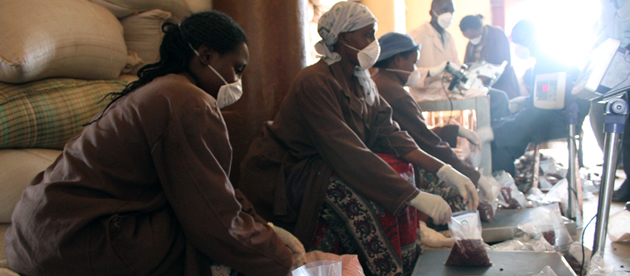Smallholder farms are just that, small. Small farms, and, invariably, small incomes.While the one of the aims of agricultural research is to increase productivity and create bigger incomes, when it comes to finding solutions, it often pays to think small – a tactic PABRA used to have a big impact on seed systems across Africa.
It started with a problem: New varieties of beans were taking an inordinate amount of time to make their way onto the market. Farmers simply weren’t adopting them.
After looking a little deeper, researchers found that most seed companies in Africa only sell seed in packs of 2kg or more, which presents a couple of major obstacles for the average smallholder farmer: Firstly, few but the largest of smallholders have enough land to sow 2kg of beans – which is enough to plant 286 square metres. And secondly, investing so much money on a variety of bean a farmer hasn’t grown before is high risk. If the crop fails, or fails to sell, a farmer can lose everything.
And so the small seed pack was born.
The simple act of making seed available in smaller packages of as little as 100g gives farmers a wider choice of varieties and enables them to buy what they can afford depending on their pockets, their land need or for testing before scaling up. When they were first introduced in Ethiopia, small seed packs of new and highly productive varieties, coupled with improved management, increased farmer access to new varieties by 375% in one year alone.
They have also given seed companies access to new markets.
Where seed dissemination was once the domain of government and development agencies, small seed packs and efforts to decentralise national seed systems, have given rise to commercial enterprise, enabling new business models for seed marketing.
Farmers can now buy bean seed at their local agro-dealer, in remote local stores, or even through travelling shops. For example, in Kenya, where a 100g pack of seed is equivalent to the price of a cup of tea, PABRA and KARI have partnered with Dry Land Seed Company, a Machakos-based seed business. Dry Land is marketing 50 tons of quality bean seed of four drought tolerant varieties in small packs ranging from 100g to 1kg through its agro-dealers across bean growing areas, giving poor farmers and women access to quality seed.
Small seed packets are being mainstreamed among major development partners and national programs across the PABRA network.
For more information about the impact of small seed packs read ‘Impacts of selling seed in small packs: Evidence from legume

